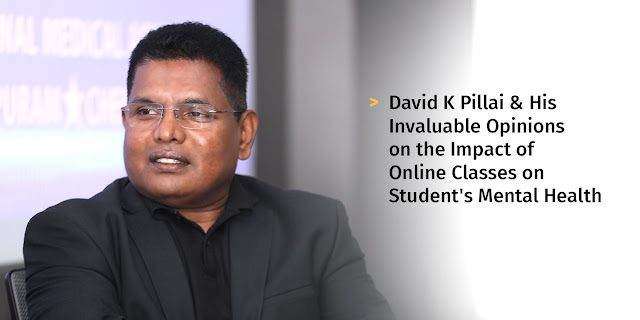It’s going to be more than 2 years
now, and the world still fears to come out without a mask. That’s the ripple
effect of the deadly coronavirus that hit the world in 2019. Of the many
sectors affected so far, education deserves a special mention as it has
undergone drastic change ever since. What was thought to be a gradual process unpredictably
got implemented overnight, and online classes became the new normal. Leading
educationist, David Pillai K highlighted the long-lasting impact of these
regular online classes on students’ mental health in his recent blog.
All That Changed during the Pandemic!
It’s better to say that the entire
system of imparting education has changed. When nations came to a halt,
educational institutions turned to a better alternative for continuing
schooling – online classes.
The beginning seemed to be quite
enticing for students who didn’t have to get ready, rush to school and study in
a constantly-monitored environment for hours anymore. However, two years later,
the scenario is like attending classes from the comfort of home, no full
uniforms, spending hours in front of mobiles, tablets or laptops, no strict
discipline to be followed, etc. What has become a major concern is the
overwhelming screen time.
This increased exposure to gadgets has
given rise to mental health issues among students, irrespective of their age.
Dr. Pillai discusses how intense the impact is in his blog!
Impact of Online Classes on Students
According to Dr. David Pillai, “I
personally believe that not monitoring a person’s mental health regularly can
result in deterioration of his physical health as well.”
The pandemic has left devastating
effect on jobs, families and industries, including students. It’s understandable
that staying engaged during this long period without schools or social
engagements is quite difficult, and the only medium to interact with the outer
world is the screen.
While this is one scenario, the other
one shows that most students are unfamiliar with the online education system.
Especially for primary sections, there remains a big communication gap, and hence,
incomplete learning as students are unable to understand their teachers many of
the times. Also, parents who are not tech-savvy struggle even more. All of
these creates an extreme mental pressure on students.
“It leaves a negative impact on their
learning ability, thereby, developing mental issues like anxiety, depression
and frustration. Not just that but they are also experiencing health issues
such as fatigue, eye strain, headaches, etc. due to long screen exposure. This
is where parents have to step in,” added David Pillai K.
The Role of Parents as Suggested by
Dr. Pillai
With immense contributions in the
field of education, David Pillai K is a man with huge knowledge and
expertise. He suggested that parents need to first understand the requirements
and challenges that their children are facing. It’s they who have to provide
complete mental and emotional support at home. Parents must have expectations
from their children considering their situation and needs.
What about Those Pursuing Higher
Studies?
Students pursuing higher studies are
no exceptions, and the situation remains the same for international medical
graduates too. David Pillai has agreed on the fact that doctors and
medical students, in general, suffer from emotional and psychological problems.
The issue is even more sensitive for Foreign Medical Graduates or FMGs.
·
As per the data he shared, 70,000+ FMGs were anxious about getting
enrolled in internships during the pandemic situation in 2021.
What raised their anxiety was the
unavailability of proper information from the Indian Embassy as well as the college.
Eventually, they turned to screen for relaxation and entertainment. Here, the
most important necessity is to maintain a proper balance between family life
and academic work, which only parents and students can ensure. Together, they
can address these challenges and the consequences of the deadly pandemic.
Dr. Pillai is a reputed leader, entrepreneur, philanthropist and educationist. Presently serving as the chairman of Kings International Medical Academy, he has worked for more than 20 years for students providing them with affordable and better medical education. His philanthropic activities are mostly centred on improving healthcare and offering free education to deserving students from rural areas. His institution, Kings International Medical Academy in association with Davao Medical School Foundation, is one of the leading in the country for their exclusive NEET coaching, FMGE program and MBBS in Philippines.
